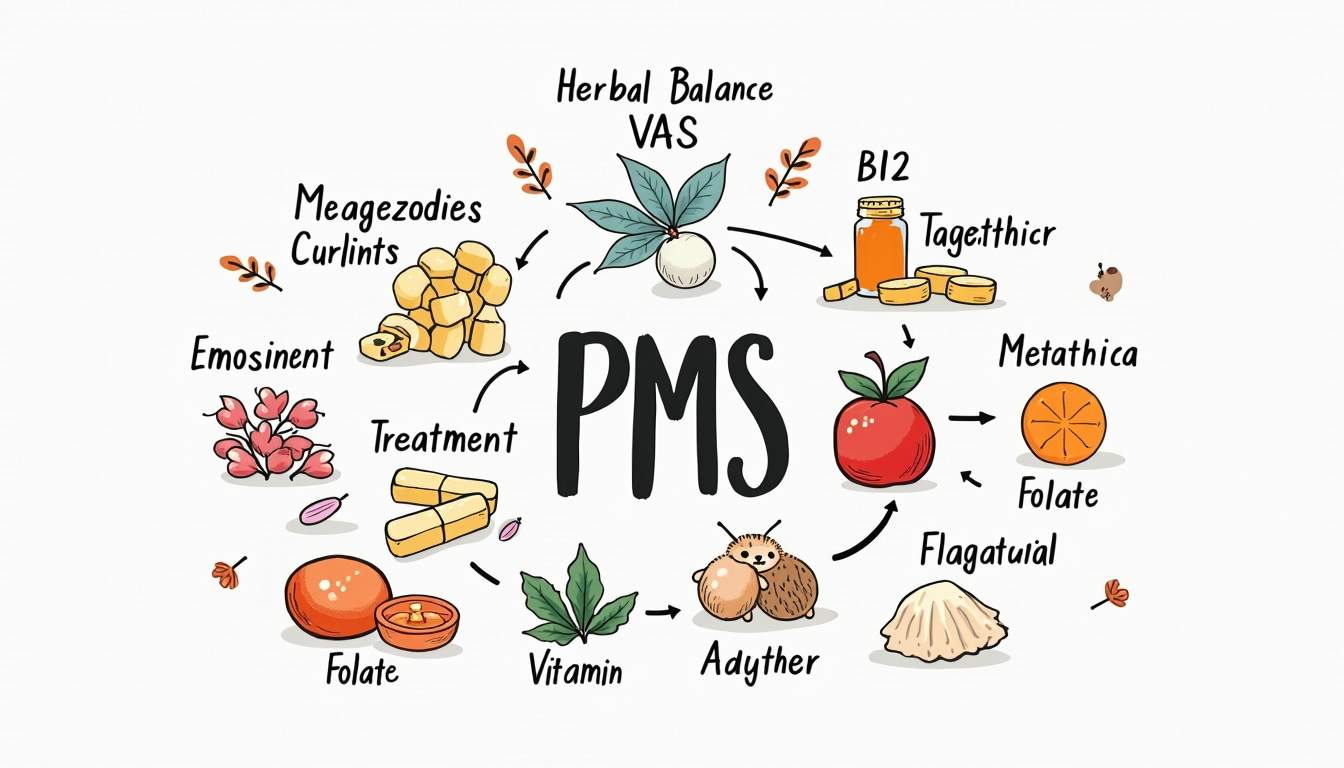Premenstrual syndrome (PMS) affects a significant number of women worldwide, manifesting in a variety of emotional and physical symptoms that can disrupt daily life. As research continues to evolve, new approaches to managing these symptoms are being explored. Among these, methylated vitamins have emerged as a potential game-changer in the quest for effective PMS relief. This article delves into the intricacies of PMS, the science behind methylated vitamins, and their promising role in alleviating symptoms.
Understanding PMS and Current Treatment Limitations
PMS is a complex condition characterized by a range of symptoms that occur in the luteal phase of the menstrual cycle, typically one to two weeks before menstruation. Symptoms can include mood swings, irritability, bloating, breast tenderness, and fatigue. While the exact cause of PMS remains unclear, hormonal fluctuations, particularly involving estrogen and progesterone, are believed to play a significant role.

The biological mechanisms behind PMS symptoms
The biological mechanisms underlying PMS symptoms are multifaceted. Hormonal changes can influence neurotransmitter levels, particularly serotonin, which is linked to mood regulation. Additionally, fluctuations in estrogen and progesterone can impact the body's water retention and pain sensitivity, leading to physical discomfort. Understanding these mechanisms is crucial for developing targeted treatment strategies that address the root causes of PMS. Furthermore, research has indicated that lifestyle factors, such as diet and exercise, can modulate these hormonal fluctuations, suggesting that holistic approaches may offer additional benefits in managing symptoms.
Why conventional treatments often fall short
Conventional treatments for PMS typically include lifestyle modifications, over-the-counter pain relievers, and hormonal therapies. However, these approaches often fail to provide adequate relief for many women. Nonsteroidal anti-inflammatory drugs (NSAIDs) may alleviate pain but do not address emotional symptoms. Hormonal treatments, while effective for some, can come with side effects and may not be suitable for everyone. This gap in effective treatment options has prompted the exploration of alternative solutions, such as methylated vitamins. Emerging research is also looking into the role of dietary supplements, such as omega-3 fatty acids and magnesium, which have shown promise in alleviating certain PMS symptoms by addressing inflammation and mood stabilization. Additionally, cognitive-behavioral therapy (CBT) has gained attention as a psychological intervention that can help women develop coping strategies and improve their overall emotional well-being during the luteal phase.
The Science of Methylated Vitamins
Methylated vitamins are a specific form of vitamins that have undergone a methylation process, making them more bioavailable and easier for the body to utilize. This process is particularly important for individuals with certain genetic variations that affect their ability to metabolize standard vitamins effectively. Methylated forms of vitamins, especially B vitamins, are gaining attention for their potential health benefits, including hormonal balance and mood stabilization. Furthermore, the increasing awareness of genetic factors influencing nutrient metabolism has led to a growing interest in personalized nutrition, where individuals can tailor their vitamin intake based on their unique genetic makeup.
What makes methylated vitamins different from standard supplements
The primary difference between methylated vitamins and standard supplements lies in their chemical structure. Methylated vitamins, such as methylcobalamin (B12) and methylfolate (B9), are in a form that the body can readily use without requiring additional conversion. This is particularly beneficial for individuals with MTHFR gene mutations, which can hinder the conversion of folic acid and other vitamins into their active forms. By providing vitamins in their methylated state, these supplements can enhance nutrient absorption and utilization, potentially leading to improved health outcomes. Moreover, the use of methylated vitamins can help mitigate symptoms associated with deficiencies, such as fatigue, cognitive decline, and mood disorders, making them a valuable addition to a health-conscious lifestyle.
How methylation affects nutrient absorption and utilization
Methylation is a critical biochemical process that involves the addition of a methyl group to molecules, influencing various bodily functions, including detoxification, DNA repair, and neurotransmitter synthesis. When vitamins are methylated, they are more easily absorbed in the digestive tract and utilized by cells, promoting optimal physiological function. This enhanced absorption is particularly relevant for women experiencing PMS, as proper nutrient levels are essential for hormonal balance and emotional well-being. Additionally, methylation plays a vital role in the synthesis of neurotransmitters such as serotonin and dopamine, which are crucial for mood regulation. As a result, maintaining adequate levels of methylated vitamins can support mental health and emotional resilience, offering a holistic approach to wellness that addresses both physical and psychological needs.
Methylated Vitamins as a PMS Solution
Given the potential benefits of methylated vitamins, researchers are beginning to investigate their role in alleviating PMS symptoms. Preliminary studies suggest that these vitamins may help regulate hormonal fluctuations, thereby reducing the severity of PMS symptoms. This section explores the clinical evidence supporting the use of methylated B vitamins for hormone regulation and offers guidance on implementing them as part of a comprehensive PMS management plan.

Clinical evidence supporting methylated B vitamins for hormone regulation
Recent clinical studies have indicated that methylated B vitamins, particularly B6, B12, and folate, may play a role in regulating hormonal activity and improving mood. For instance, vitamin B6 is known to influence neurotransmitter synthesis, which can help alleviate mood-related symptoms of PMS. Methylated forms of these vitamins have shown promise in enhancing mood stability and reducing anxiety, making them a valuable addition to PMS treatment protocols. Furthermore, a growing body of evidence suggests that these vitamins can also aid in the metabolism of estrogen, potentially mitigating the hormonal imbalances that contribute to PMS symptoms. As researchers delve deeper into the biochemical pathways influenced by these vitamins, the hope is to uncover even more targeted interventions for those suffering from PMS.
Implementing methylated vitamins: Dosage, timing, and complementary approaches
When considering the implementation of methylated vitamins for PMS relief, it is essential to consult with a healthcare professional to determine the appropriate dosage and timing. Generally, methylated B vitamins can be taken daily, with some individuals benefiting from higher doses during the luteal phase of their menstrual cycle. Additionally, incorporating lifestyle changes such as regular exercise, a balanced diet rich in whole foods, and stress management techniques can further enhance the effectiveness of methylated vitamins. Nutritional strategies, such as increasing the intake of magnesium and omega-3 fatty acids, may also complement the benefits of methylated B vitamins, as these nutrients have been shown to support hormonal balance and improve overall mood. Moreover, mindfulness practices like yoga and meditation can help reduce stress levels, which is crucial for managing PMS symptoms effectively.
As research continues to evolve, the understanding of how methylated vitamins interact with the body’s hormonal systems is becoming clearer. The potential for these vitamins to not only alleviate PMS symptoms but also to promote overall reproductive health is an exciting area of exploration. By focusing on a holistic approach that includes dietary adjustments, lifestyle changes, and the strategic use of methylated vitamins, women may find a more effective path to managing their PMS. This integrated strategy not only addresses the immediate symptoms but also fosters long-term health and well-being, empowering individuals to take charge of their menstrual health.

Share:
Adaptogenic Herbs for Stress Relief: How Rhodiola and Bacopa Help You Stay Balanced
How AI-Driven Personalised PMS Supplements Are Changing Women's Health by 2025